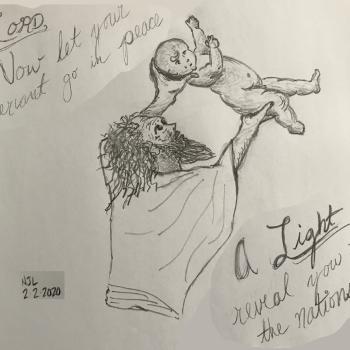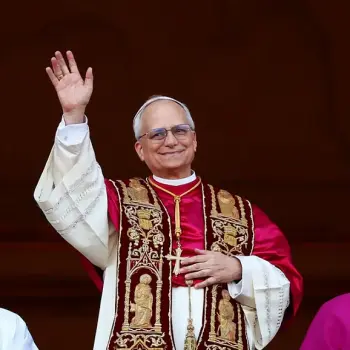As they were eating, Jesus took bread, and blessed it, and brake it, and gave it to the disciples, and said, Take, eat; this is my body. And he took the cup, and gave thanks, and gave it to them, saying, Drink ye all of it; for this is my blood of the new testament, which is shed for many for the remission of sins (Mt. 26:26-28).
Mormons celebrate the Sacrament each Sunday, receiving bread and water (in place of wine) that has been sanctified to our souls by the ritual (we say "ordinance"). The prayers said over the Eucharistic elements are given in the Book of Mormon (Moroni 4-5), and they tell us what that sanctification entails: We partake of the bread and water in remembrance of the sacred body and blood of Jesus Christ, who suffered pains in the flesh and was crucified for our sins, and we believe that to eat the bread and drink the water is to witness to God the Father that we are willing to be called by the name of his Son.
To take part in the Sacrament is to testify to God that I am willing to be called a Christian, and to recognize what that willingness entails. As the events in the Upper Room show, they entail service and communion.
With the Sacrament we testify that we will remember Jesus Christ always. We will not just keep his name in mind; we allow our lives to become a memorial to his. We promise also to keep his commandments, another way of saying that we will remember him always. And we understand that by taking part in the Sacrament we are promised his Spirit as a guide and witness.
John 13 helps us see the connection of the two events of that evening, Jesus washing the feet of his apostles and their communal meal culminating (according to Matthew) in the Sacrament. In fact, John helps us see how the two come together in meaning: Jesus shares food with his fellows in an act of memorial and pledge, but he makes that meal possible by stripping himself like a slave and washing their feet in both humility and welcome.
"Welcome," he says, "to my kingdom, a kingdom in which there is ultimately only the hierarchy of mutual servitude, a kingdom in which we share the bread of life, both physical and spiritual, as friends covenanted to one another before the Father." The unity of covenanted fellowship is made possible by the humility of service.
Traditionally Good Friday is a day of fasting, prayer, and meditation. It is a time to think about our sins and the sacrifice for sin that Jesus has made, the sacrifice that marks him as Christ, the Anointed One, the Messiah. Obviously this is a good day to reread and think about the story of Christ's suffering and crucifixion, his passion: Matthew 26:30-27:66, Mark 14:26-15:47, Luke 22:39-23:56, and John 18:1-19:42.
Perhaps our question for meditation should be "What has Christ done?" We are told that he died for our sins (Gal. 1:4), not just for we who are already his followers, but for the sins of all the world (1 Jn. 2:2). Meditating on that teaching, we might consider not only our personal sins, but our sins as a people: as Mormons, as another kind of Christian, as Americans, as some other nationality, as rich, as poor, as male, as female, as young, as old.
The word our can be understood in two ways, as a group of individuals considered individually or as a group of individuals considered as a group. We sin in both ways. Christians understand the sacrifices of the Old Covenant to anticipate the sacrifice of the New. We ought not to forget that the sacrifice for sin under the Old Covenant was not only for individual sin, but also for collective guilt (e.g., Lev. 4:13-21), for we are sometimes so focused on our individual sins and the hope for salvation from them that we selfishly overlook our communal sinfulness.





